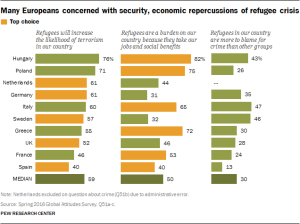French Primaries: Please, Do Focus on Economy!
 French euro coin.
Source: https://flic.kr/p/6LmoPu
French euro coin.
Source: https://flic.kr/p/6LmoPu
Fueled by the terrorist attacks and the refugee crisis, the French dispute about “national identity” is on everyone’s lips: burkini feuds this summer, fights between locals and immigrants in Corsica, controversy around the hijab at universities, introducing Arabic classes in primary school, and the headlines about Islam abound. Even so, be it “happy” or not (cf. my previous article), identity is not the main cause of France’s decline, and the Republican candidates should indeed focus on relaxing the economy.

Source: https://flic.kr/p/6LmoPu
The editorialist Alain Duhamel has recently published an essay called The French Political Pathologies, in which he criticizes the typically “French inconsistency” responsible for economic half measures and thus the stagnation of the country. Commenting on this essay, columnist Charles Jaigu agrees that “Neither Europe nor the immigrants are guilty for the French not working anymore, as if they could go on and live like in the good old days of the colonies. Too many holidays, too many pensions, too many compensatory days…” Indeed, the Fraser Institute locates France as #57 (on a total of 159) for its economic freedom in 2016, compared to Canada at #5. Mathieu Bédard, an economist at the Montreal Economic Institute (MEI), thus calls the French employment law “rigid” because it counts 3809 pages of regulations and hinders dismissals (even when an employee steals from his company), which in turn makes employers reluctant to hire.

This ever-growing unemployment as well as high public debt date back to 40 years ago (incidentally, Mitterrand and his “force tranquille” remind one of Alain Juppé’s “identité heureuse”) and are not due to immigration, but instead to France’s overall socialist economy. In 2014, the debt was already over 30,000 EUR per inhabitant, and to this day France is the country with the highest taxes in Europe.
Fortunately, the candidates all promise a significant reduction of public expenditures, ranging from 85 to 100 billion EUR, while they announced their intention to lower taxes (from 30 to 50 billion EUR, including the suppression of the Impôt de solidarité sur la fortune (ISF), i.e. the Solidarity Tax on the Capital) throughout the next five-year term. Despite the fact that each candidate advocates a more liberal French economy, chances are they will forget about their plan once assuming power, as did Juppé and Sarkozy in the past.
Even though the collapse of education and the failure of the so-called “de-radicalization” remain major issues, France would truly benefit from a radical opening of its economy. Enough already with this “French exception!”
